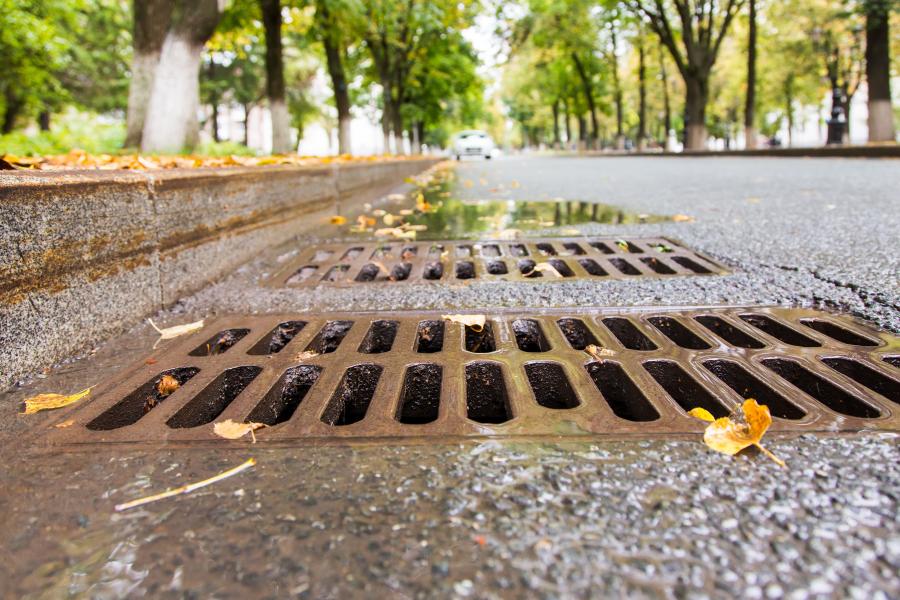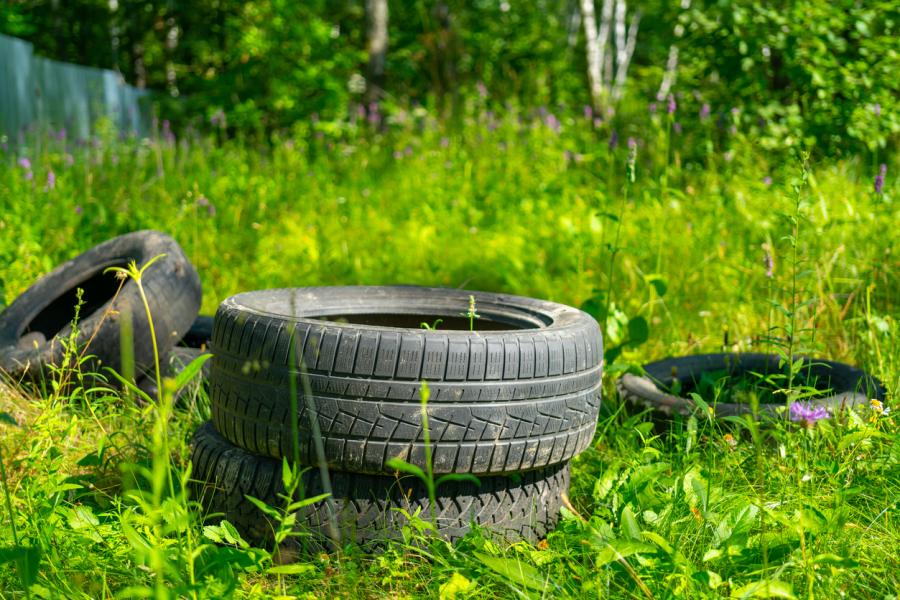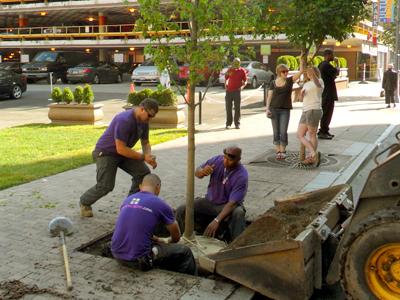
The way we think about stormwater is changing. There was a time when residents felt they had no choice but to live with polluted waterways. Flooded basements or sewage backing up into homes was expected. But that’s not the case any longer.
- Our waterways can be cleaner if we all pitch in and share responsibility.
- State and Federal regulators require us to address sewage overflows and basement backups through improved stormwater infrastructure.
- There’s more rain. With heavier, intense and more frequent rainstorms, the number of flooding and backup events is increasing. We need to manage stormwater differently.
- It’s expensive. Constantly cleaning your home after a flood adds up. And with increasing property values, residents want to protect their homes and investment.
Here are some ideas and resources to help you manage stormwater. We encourage you to give these a try. Everyone in Pittsburgh needs to become part of the stormwater solution.
Stormwater Solutions At Home
Everyday Practices for Home and Garden

The little things you do everyday matter when it comes to managing stormwater, improving water quality and protecting your home from flooding and sewage. By following these simple steps, you can help keep our sewer system free and clear of debris, reduce the toxins entering our waterways, and better protect your home from the challenges caused by too much rain.
- Debris Free: Keep drains, gutters, and downspouts clean and free of debris. Do not pile leaves or other yard waste near storm drains.
- Tidy Up Yard Waste: Yard waste left on the ground can block and clog storm drains, contributing to street flooding when it rains. Excess leaves and grass clippings can also cause nutrient pollution and oxygen depletion in our streams and rivers when carried there through storm drains and sewer pipes, which harms fish and other wildlife.
- Rake Responsibly: Do not rake or blow leaves or grass clippings off your property into the street. Place your leaves in a bag for curbside yard debris collection or compost them at home.
- Mow Mindfully: If you have a mulching lawnmower, use it to recycle leaves and their nutrients into your lawn instead of using fertilizers.
- Fertilize Sparingly: Fertilizers contain nitrogen and phosphorus which are great for plants but can be washed away into our streams and rivers when it rains. These nutrients can cause excessive growth of algae and aquatic weeds. Algae reduce the amount of oxygen in the water, which kills fish and aquatic wildlife.
Test your soil before applying nutrients, don't overapply and choose natural and slow-release fertilizers when possible.
-
Pick Up After Pets: When it rains, pet waste on the ground is washed away into storm drains and pipes to our streams and rivers. Water contaminated by pet waste is unsafe for swimming or other recreational activities, since the bacteria, parasites, and viruses in pet waste can cause serious health problems in humans.
Reduce Pollution: Recycling and Waste Reduction Resources

When it comes to the improvements made in and around the home, it's important to properly dispose of things like upholstered furniture, mattresses, carpets, yard waste, wood debris, vehicle parts and tires.
The City of Pittsburgh's ordinance on littering and dumping prohibits illegal dumping in any public place, right-of-way, vacant lot, private premise, sewer, or into the waters in the City.
- Bulky Items: Bulky items such as sofas, mattresses and carpets can be collected with your regularly scheduled refuse pickup. To check on other items that can be collected with your normal trash pickup, visit: The City of Pittsburgh Bulky Waste information page.
- Electronics and Hard to Recycle Household Products: Unsure how to recycle hard to recycle items and electronics? Visit the DEP's Recycling and Waste Reduction webpage for resources.
- Household Hazardous Chemicals: When completing home repairs or maintenance that requires use of chemicals, it’s best to buy the smallest quantity needed get a job done of any strong chemicals such as paints, automotive fluids, pesticides, stains and cleaners. Doing so minimizes the risk of spills and of those chemicals entering the environment. You can also consider using less-hazardous alternatives. Visit the DEP's Household Hazardous Waste page for resources on recycling old paints, stains, cleaners and other hazardous materials.
- Old Tires: Improperly disposed waste tires are bad for the environment, public health and safety. Waste tires can pollute the environment, impede streams and encourage mosquitos. The City of Pittsburgh Public works operates an ongoing collection program at three locations around the city. To learn more about these locations as well as other resources related to the proper disposal and recycling of waste tires, visit the DEP's Waste Tire Program website.
- Motor Oil: Over time, cars and lawnmowers can leak. If you spot a leak, fix your car or lawnmower immediately as a very small amount of oil can contaminate a lot of water. Improperly disposed oils are very harmful to the environment. If you change your own oil at home, visit the DEP's Motor Oil Recycling Page for resources about recycling your old oil.
Green Infrastructure Techniques

Many homeowners in Pittsburgh have installed some green solutions to collect stormwater. Doing this is a positive way to help keep stormwater out of the sewer system, protect your home from runoff, and improve the environment.
Rain Barrels: You can direct water from your roof into a rain barrel and then repurpose it to water your garden or wash your dog. There are a variety of sizes and styles available for purchase or you can make your own.
Plant a Tree: Trees are our stormwater soldiers. They soak up more water than any type of vegetation and provide many environmental benefits. If you have room, plant one in your yard or organize a neighborhood planting. Use species that are native to Pennsylvania and can adapt to our climate.
Install a Rain Garden: Rain gardens are designed like a bowl so they can capture and hold the rain during a storm. When it passes, the water slowly soaks into the ground. They range in complexity, use soils that are more absorbent, and work well with native plants or vegetation that can withstand our climate.
Rain Garden Resources
Raingarden Plants from the Pennsylvania Agricultural Extension
Layers of a Raingarden
Permeable Pavers: If a future home improvement project involves repaving a driveway or walkway, or refinishing a deck or patio, consider permeable pavers. They use materials that absorb water and come in a variety of decorative styles that are nicer than concrete.
Home Composting: Compost organic materials which can later be used to enrich your soil. If composting at home, be aware of our City's composting ordinances and make sure your compost is contained and drainage is controlled. Never add animal products or animal wastes to your compost and avoid adding synthetic fibers like plastic.
Southwestern PA’s Homeowner’s Guide to Stormwater provides instructions for developing and implementing a stormwater management plan for your property. Visit www.stormwaterguide.org to create your plan online and watch Penn State University's instructional videos.
Flood Preparedness at Home
Many people in Pittsburgh are all too familiar with the reality of flooded basements, and overflowing sewers. It’s scary and the clean up is expensive. But the cost of doing nothing is too great for your health, the value of your home, and your quality of life.
Our flood preparedness page describes the type of flooding commonly experienced in Pittsburgh as well as safety tips to protect your family, home, and valuable documents before, during, and after a flood.
Case Studies
Bringing mindfulness to our individual stormwater management practices can have benefits not only for our own properties, but also for our neighborhoods and our region at large.
Our case studies page highlights the effective efforts of residents and commercial property owners in our area to do their part for our sewersheds.
Links to Additonal Stormwater Resources
One Water - Pittsburgh's Guide to Action
Southwestern PA’s Homeowner’s Guide to Stormwater (updated 5/24)
Homeowner's Guide to Stormwater Website
UpstreamPgh (previously Nine Mile Run Watershed Association and StormWorks)
